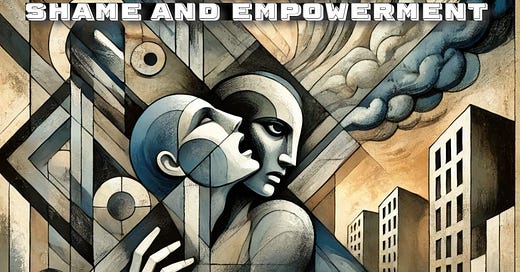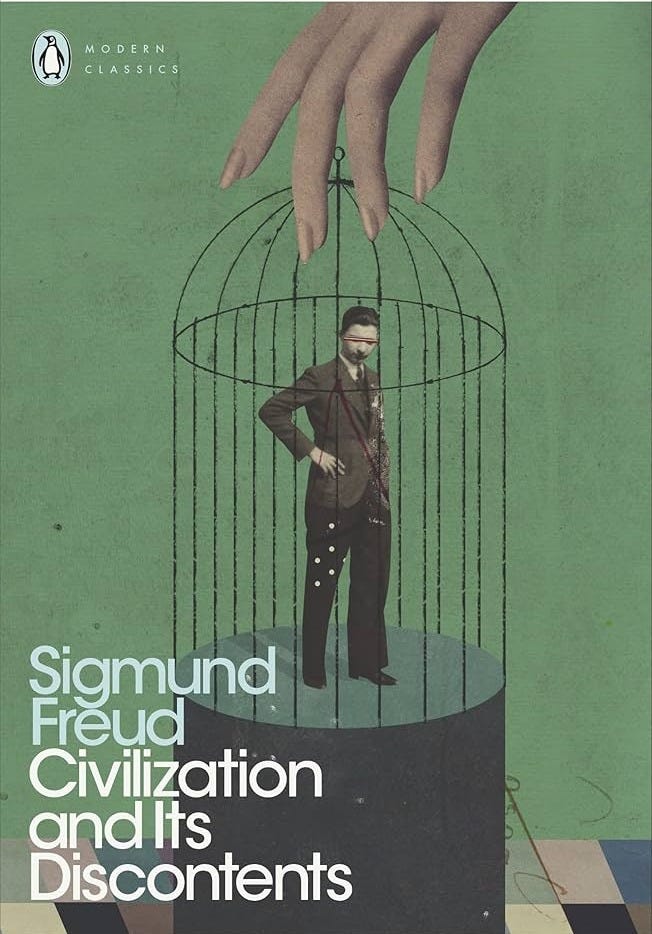I’ve had this nagging thought for the past week. So before I zip up our bag for a daddy-daughter trip to London, I want to unload this thought here. So here goes…
I wonder if the intersection of shame and empowerment helps to explain the endemic stress and frustration in our Age of Anxiety.
No longer inspired by progress or the promises of civilization, let alone the “triumph of Western Civilization,” we tend to wear the shame of our historical inheritance as a burden. The often misguided battles over how history is taught illustrate some of the dimensions of this shame, as well as some of the efforts to suppress or sideline shame.
But it’s much more than our historical inheritance. It’s the contemporary manifestations of that history. We carry with us the shame of knowing that our comfortable lives are built on the misfortune of others. If you’re reading this, odds are that you–sometimes consciously, sometimes unconsciously, but nevertheless frequently–engage in patterns of behavior (consumer patterns and otherwise) that result in difficulties, hardships, and indignities for others. They may be your neighbors. They may be an ocean away. But still. It’s exploitation. It’s an inconvenient truth. It’s hard to live with.
It’s hard to live with what we’ve done and what we’re doing. We’ve thoroughly enjoyed our (artisanal) bread and circus amidst, sometimes because of, the wreckage of human lives. We’ve participated in the decimation of dreams and the destruction of cultures in the name of progress and civilization (also in the name of coffee, cocoa, and cobalt).
It’s also hard to live with the environmental impact of our lives. And it’s not just about climate change. It’s about air pollution, water pollution, deforestation, plastic waste, biodiversity loss. Must I go on? We’re all participants in a project of global destruction. We’re all complicit. What we’re doing is shitty, so we feel shitty. What we’re doing is shameful, so we feel ashamed.
There’s shame in having it so good when other people and other species have it so bad.
It may feel like survivor’s guilt. But worse, because the survivor is not usually complicit in the perpetration of the atrocity.
Chances are that if you’re reading this, you walk with shame. You enjoy a certain amount of economic security (earned or otherwise) and political stability (relatively speaking). Our country of origin (our zip code, if you prefer) says a lot, too damn much, about our access to power. This includes the power to exploit others, which we all do. This breeds anxiety. Neuroses. Guilt. Shame.
Much of the anxiety of the last Age of Anxiety was also a manifestation of shame. The 1920’s were ravaged by the shame of the horrors perpetrated in World War I. As Freud wrote so clearly amidst the fog of war in The Disillusionment of the War: Thoughts for the Times on War and Death (1915):
[O]ur mortification and our painful disillusionment on account of the uncivilized behavior of our fellow-citizens of the world during this war were unjustified. They were based on an illusion to which we had given way. In reality our fellow-citizens have not sunk so low as we feared, because they had never risen so high as we believed. The fact that the collective units of mankind, the peoples and states, mutually abrogated their moral restraints naturally prompted these individual citizens to withdraw for a while from the constant pressure of civilization and to grant a temporary satisfaction to the instincts which they had been holding in check…
We cannot but feel that no event which calls forth such ruthless cruelty, such an abandonment of the restraining influences of civilization, could have come about without leaving a permanent scar on mankind.
Most readers of The Junction have not engaged in nor been subjected to a state of war. But we’re still marked with scars of shame.
Indeed, in some ways, it’s actually harder for us to connect to our shame and see our collective, permanent scar. Our role in the destruction seems less clear than that of the soldier.
Freud saw the shame even more clearly after WWI. In Civilization and Its Discontents (1930), he explores how shame is often linked to the public recognition of having acted against social norms or having failed to live up to personal ideals. After WWI, many soldiers and civilians experienced a “universal sense of guilt” and collective shame about the atrocities committed during the war and the overall disillusionment with the promises of civilization.
In 2018, a hundred years after WWI ended, psychologist and linguist Steven Pinker published Enlightenment Now: The Case for Reason, Science, Humanism, and Progress. Pinker argues that human progress—particularly in terms of health, wealth, safety, peace, and happiness—has significantly improved due to Enlightenment values such as reason, science, humanism, and rational thought. The book is teeming with compelling data that illustrate positive global trends, such as declining violence, longer lifespans, and rising education levels. Pinker contends that, despite pessimism and negative news cycles, the world is getting better, not worse.
Pinker may be right. There is, at the very least, a truthiness to his argument. And is argumentation is profoundly compelling. New York Times bestseller. Five stars. Legit. Read it.
But how are we feeling? The data on depression and anxiety is clear.
The fine folks of the 1920’s and the 2020’s both feel disillusioned by promises of civilization. But I’m not persuaded that 1920’s folks felt nearly as empowered as us 2020’s folks to right the wrongs of the past–by rewriting history and otherwise–nor were they as likely to see themselves as empowered agents for change.
We feel so ashamed. Yet, we feel so empowered. It’s this precise, discomforting nexus probably says something about our anxieties in the 20’s.
Look. There are a lot of problems in the world. There have always been a lot of problems in the world. But in our global age with our global media, we learn more and we think more about problems around the globe. Some of these are global problems that affect us all while some of these are local or regional problems that have little to no bearing on our lives. Our sense of global awareness is wonderful. The world is a village. I teach a global politics course. I both pour and drink this Kool-Aid. Think globally, act locally…or globally…just act! Do something.
To our credit, many of us feel a sense of duty to do something to make the world better. With this sense of obligation comes a sense of empowerment. We’re empowered by our platforms. We’re all citizen journalists, vaguely empowered. We’re able to scream from the mountain top without having a climb the mountain. Post. Re-post. Like. Comment. Share.
But the harsh truth is that most of us are dreadfully powerless. We hardly even have power over our own little lives. Yet we actively pursue the illusion that we have power over rising sea levels, and genocides, and the outcome of wars.
Hey. Maybe it’s better to walk with the illusion of power than to throw in the towel and succumb to the indignities of impotence.
I used to post this Alice Walker quote in my classroom: "The most common way people give up their power is by thinking they don’t have any." Moreover, my students still read some of the greatest hits of Walker’s old history prof at Spelman College, Howard Zinn, whose best writing details how powerful we can be when we get organized.
But we’re not organized. We’re Bowling Alone, bereft of communities. We seek empowerment in isolation. It doesn’t work like that. We feel empowered but are disempowered by our isolation.
Thus we suffer from neuroses manifest from feeling so ashamed and empowered in the same breath.
So what? What is to be done?
I’ll think about it. For now, I just hope that the awareness of this might help people at this perilous intersection, perhaps that’s only me, to break through to the next level of consciousness.
Let me be clear. I’m not arguing that our consciousness of the problematic intersection of shame and empowerment will set me/us free. There’s the pandemic fallout, eco-anxiety, raging wars, economic instability, political uncertainty, social isolation, information overload. All this is dreadfully real. Tough times. Legit. No easy answers.
But answers aside, it’s easier, for me at least, to see the problems more clearly when I have a better sense of the obstacles before me.
And hey. It could be that I’m projecting here. I’ve projected before and I’ll project again. But I’ll go out on a limb here and hypothesize that I’m not the only one who stands at the junction of shame and empowerment.
Alright. Unfinished work here. But I gotta wake up my kid to hop a train to a plane to a train to London. Looking to put this particular problem behind me, if only for a week. Gotta focus on looking right before I cross.
Yours,
DL




